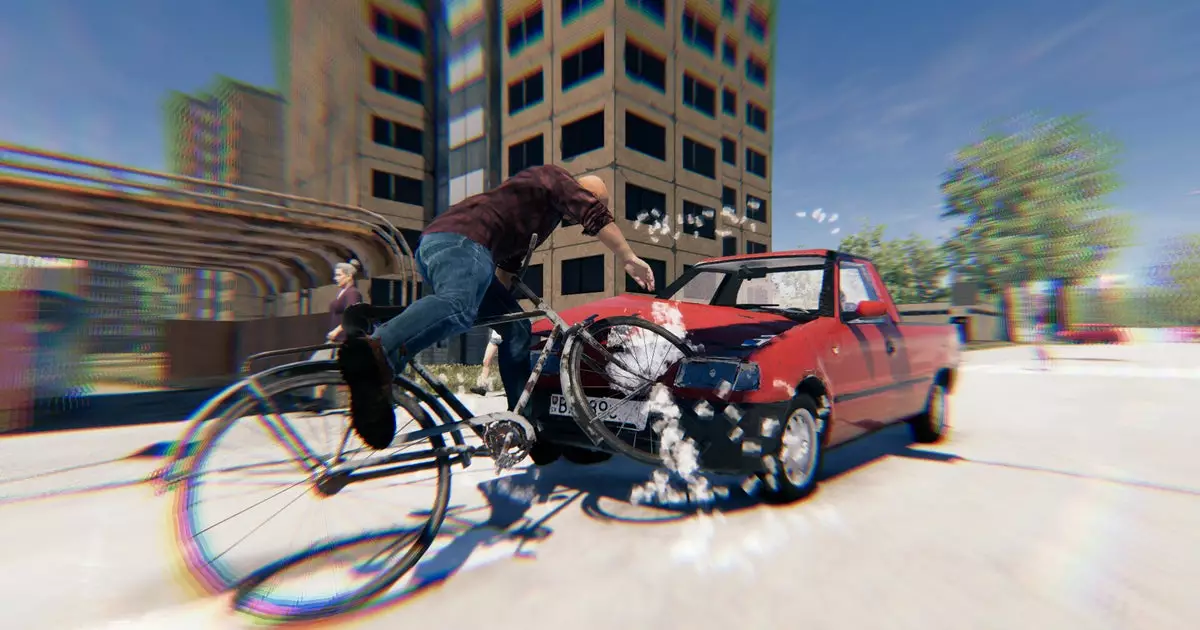Vivat Slovakia invites players into a chaotic yet charming universe, immersing them in the life of Trotter, whose recent trailer sparks a flurry of questions. The scene unfolds akin to an abstract art piece; Trotter, an undercover cop by day and a taxi driver by night, is awkwardly perched on a coffee table—a curious choice that begs for dissection. The setting replete with piles of money and what appears to be a whiskey bottle, outlines a vivid tableau where humor meets absurdity. The dog lounging in the chair appears to be a peculiar sidekick, adding to the surreal atmosphere, yet the significance of this arrangement remains elusive.
While on the surface this might seem merely a whimsical situation, it encapsulates a deeper commentary on the character’s world. Trotter is not just another video game protagonist; rather, he is a symbol of the post-Communist societal shift in Slovakia during the tumultuous ’90s. This duality of his existence as both a cop and a taxi driver could reflect the complexities faced by those navigating the waters of a nation in transition. However, instead of painting a somber picture of defiance, the developers have infused humor into this chaos. Trotter’s bizarre pose and the odd assortment of furniture suggest that the game does not take itself too seriously—something that could make it just as comforting as it is perplexing.
Decoding Trotter’s Peculiar Behavior
The act of squatting atop a coffee table, however strange, could be an exploration of character motivations. There are a myriad of playful interpretations of his actions: he could be protecting his wealth from the perceived threats around him, or perhaps he simply believes that, by distancing himself from the ground, he is somehow engaging with a higher power of ingenuity. The visual spectacle effectively raises the stakes of Trotter’s quirky vigilance, as he transitions from an unassuming taxi driver to a hilariously paranoid guardian of his domain.
Yet, viewers also notice the dog—a potential landlord or perhaps an arch-nemesis—whose actions remain equally enigmatic. Is this canine companion a reflection of loyalty, asserting dominance, or a reminder of the responsibilities that weigh heavily on Trotter’s shoulders? Observers might argue the dog is a sly representation of authority, coupled with its apparent enjoyment of idleness encompassed in an elegant chair. Significantly, this relationship crafts a multilayered narrative that critiques the rising capitalist ethos against the backdrop of socialist history.
The Peculiar Charm of Tablepunk
The idea that Trotter fears the floor is an arresting metaphor for modern anxieties—the fear of stagnation amid societal progress. Could his actions indicate a profound existential crisis or merely an exuberant escapism found in unusual things, like a coffee table? It introduces the notion of “tablepunk,” a vibrant new sub-genre that defies conventional boundaries of gameplay and narrative structure. Vivat Slovakia embraces unpredictability, turning old concepts on their head to demonstrate how new narratives can thrive in established genres.
Trotter’s odd behavior at the coffee table, whether it’s a comedic fear of lava or a triumphant installation of domestic bliss, speaks to our fascination with the absurd. The very essence of humor in gaming hinges on the bizarre actions of characters who mirror our often nonsensical experiences. Instead of promoting overt violence or drama, the creators of Vivat Slovakia offer a refreshing take by showcasing daily absurdities, highlighting moments of spontaneous hilarity, much like one may experience in the whimsical world of real life.
A Forward-Looking Perspective
As Vivat Slovakia gears up for its official release on April 17, the game emerges as a beacon for those drawn to alternative narratives in an open world. It speaks volumes not just about the setting but embraces the idiosyncrasies of its characters. The game promises a bizarre blend of humor, existential questions, and an innovative approach to storytelling that echoes the unpredictability of life itself amid societal upheaval.
Given its unique premise and eccentric charm, Vivat Slovakia paves the way for a fresh gaming experience that lingers on themes of community, companionship, and absurdity. The interplay of Trotter’s eccentric behavior with his seemingly run-of-the-mill surroundings invites a dialogue that transcends mere entertainment—it becomes a satirical reflection of navigating life’s complexities, thus guaranteeing that players will find themselves both amused and intrigued as they journey through this vivid realm.

